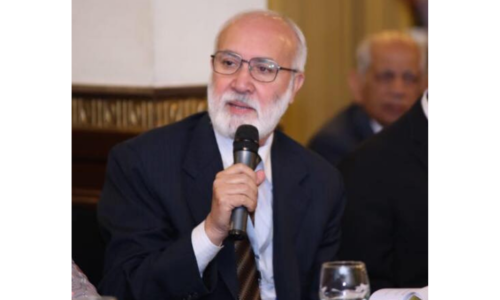
DISTINGUISHED print and broadcast journalist Farhad Zaidi, who passed away in Karachi on Friday, had only recently celebrated turning nonagenarian.
An icon of the old school of journalism, Zaidi sahab (as he was called by his juniors) was widely known for his grace, warmth of personality and natural gentility. As a professional, he was truthful, selfless and courageous. Those who ever had the privilege of working with him or even being acquainted with him will support my assessment.
Born in a reputed Syed family in the Indian town of Jaunpur, he had spent his early years in Aurangabad, where his father was posted. The Zaidi clan later made Lahore home, and it was from there that Farhad Zaidi started his long and illustrious career in Pakistani media.
My first two meetings with Zaidi sb were introductory and mostly perfunctory, as he did not know me well at the time; yet, they remain etched in my memory. The first was sometime in the mid-1970s, when fellow journalist and friend Zafar Qureshi, who had worked with him in a newspaper, took me to Zaidi sb’s residence in PECHS, Karachi.
This was followed by another, when I escorted my late boss, Muslehuddin sb of PTV, to Shezan in Karachi. The now-shuttered restaurant became a rendezvous for two displaced Laborites.
Zaidi sb started his career in journalism during the 1950s with Urdu dailies like Imroz, Nawa-e-Waqt and Mashriq. However, it was the editorship of the daily Hurriyat, an Urdu publication of the Dawn Media Group, which truly pushed him to prominence.
He edited the newspaper with professional distinction and shaped it into one of the most popular sources of information at the time. As a prolific writer, Farhad Zaidi gave the publication a new identity: he introduced features based on human interest stories and highlighted civic issues. He also brought in op-ed pieces which, though they were mostly political in nature, were literary gems in their own right.
This was an uncommon style in contemporary journalism and these editorials greatly influenced society at large. He later joined the daily Muslim — an English-language daily based in Islamabad — as part of its management. During this period, he was twice elected as President of All Pakistan Newspapers Society.
It would be unfair to compare Zaidi sb with his contemporaries in print media, as he was equally accomplished in the world of broadcast journalism. Appearing as compere in current affairs talk shows on the state television network, he was the perfect television personality: polite, well-informed and a professional who knew what he was doing.
He would be the preferred choice whenever PTV wished to interview politicians as part of its pre-election exercises.
His television background was perhaps instrumental in his eventual appointment to spearhead the network in the 1990s. Heading PTV came with near-daily pressures from the sitting government. Besides, handling its administration was no mean task as rampant intrigue and petty wrangling were quite common.
Yet, Farhad Zaidi navigated the network with good governance and completed his stint with an unblemished reputation. Very few know that he was also instrumental in opening the doors to the private sector to produce commercial news for state television.
Earlier in 1978, along with longtime friend and journalism colleague Ghazi Salahuddin, he was one of the most senior journalists who courted arrest to protest curbs imposed on the press by the military dictatorship of Gen Ziaul Haq and the flogging of journalists.
He was sentenced to six months in Lahore’s Kot Lakhpat jail, but was eventually freed after a few weeks. His prison diaries were later published in the weekly Mayar.
It is regretful that Zaidi sb’s literary side was eclipsed due to his high-profile involvement in journalism. His epic poem Sharif Aadmi (Noble Man), written at the time of the hanging of Zulfikar Ali Bhutto, brought him much acclaim in later years.
With his passing, the world has lost a gentleman who represented the finest breed of journalists this country has produced.
His Namaz-i-Janaza was offered at Yasrab Imambargah in the evening and he was laid to rest at the DHA phase-8 graveyard.
He is survived by his wife of 53 years, Mussarat Jabeen, the former editor of Akhbar-i-Khawateen, Nusrat and Millat, and sons Hasan Zaidi (Editor magazines at Dawn) and Ali Faisal Zaidi (Producer at BBC).
Published in Dawn, March 12th, 2022













































